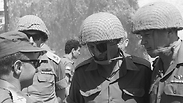
Documents from IDF archive shed new light on Six-Day War
48 years after the Six-Day War, documents released by the IDF paint a picture of the mounting tensions in the run-up to the war and the moments of triumph etched deeply in Israeli minds.
All of the tensions felt in the run-up to the Six-Day War accumulated into one IDF General Staff meeting on June 2, 1967, which included the members of the Ministerial Committee on National Security Affairs.
Video footage and rare documents released by the IDF Archive this week shed more light on the military campaign which is considered the most successful in Israel's history.
On one side were then-IDF chief of Staff Yitzhak Rabin and his generals - eager, decisive and confident in their strength - who persistently demanded to strike as fast as possible and deliver a preventative blow to Egypt. On the other side was then-prime minister Levi Eshkol - level-headed, thorough and wary of the "one stroke" concept which was being presented to him by the uniformed officers with so much confidence.
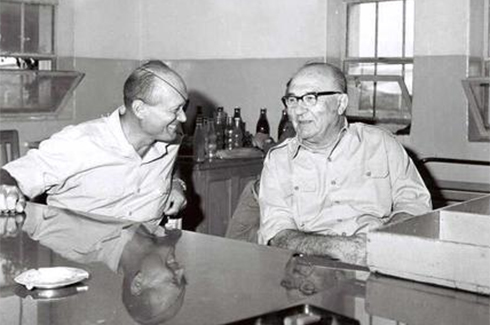
In between were the ministers of the emergency government only recently appointed, including then-defense minister Moshe Dayan and new minister Menachem Begin.
Then-head of Intelligence, Aharon Yariv, explained to the gathered statesmen what the implications of postponing the attack in two-to-three weeks could be.
"There is no gain or benefit in freezing the situation with regards to the chances the military situation will change in our favor during this timeframe," he said.
According to Yariv, any day that passes by allows the Egyptians to further enforce their fortifications in the Sinai Peninsula, train their troops for the upcoming war, and receive military equipment from the Soviet Union.
"Any day that passes by significantly reduces Israel's chances of achieving aerial supremacy," he said.
Yariv later warned that postponing the Israeli assault could encourage the Egyptians to make further initiatives, one of which could be "delivering a blow to destroy Dimona and perhaps even airports."
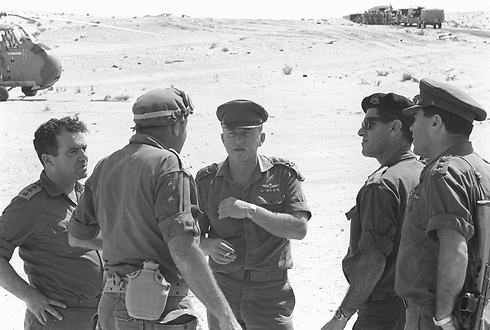
Yariv then addressed the security cabinet's main diplomatic concern: How would the United States respond to an Israeli assault?
The Intelligence chief tried to calm the gathered politicians, quoting a series of reports from the international media from which he reached the conclusion that "We are not being spurred to launch a battle, but there is also no terrible threat over our heads if we do.... the (US) president will be angry and we will be condemned, but if we act wisely and quickly - according to our assessments and based on all kinds of hints given to us, there is a possibility the United States will not constitute the main obstacle to our plans... I believe it is not the United States as a world power, nor the negotiations held between us and the US recently, should serve as an obstacle to a crushing and speedy action by the IDF."

At this point of the meeting, chief of staff Rabin noticed the government ministers' hesitation, their trepidation of the international community's response, and their lack of confidence in the IDF's strength.
He then worked to soothe their fears: "This forum, with myself first and foremost, and I am confident most of the high-ranked officers as well, does not want a war for the sake of war. I believe we might find ourselves in a military situation in which we lose a lot of the advantages and we might reach a situation, which I do not wish to express with harsh words, but there will be a serious danger in such a situation to Israel's existence. And this war will be hard, harsh and claim mass casualties."
Rabin went on to say that, "I don't care if someone did this for us, but I do not believe someone will... this will not be an easy operation like (the 1956) Kadesh Operation. I think we are entering a situation today that in my opinion we cannot escape. Time is not on our side, and in a week or two or three or four, the situation will be worse."
'Pawns in US and Soviet Union's chess game'
Later on, Intelligence chief Yariv returned to the American issue, explaining to the ministers that the conflict with Egypt cannot be viewed as just a regional Middle Eastern conflict, but as part of the bigger picture of global power struggles.He portrayed it as a chess game between the US and the Soviet Union. According to Yariv, each of the world powers wants to protect its interests in the Middle East without having to play an active part in the conflict.
"In a game of chess there are pawns. And we are pawns. Egypt, as big and strong and successful as it is - is also considered a pawn here. There are serious pieces in this game, queens and columns."

Then-health minister Yisrael Barzilai asked whether there is a possibility of the Soviet Union interfering if Israel launches the attack.
"I do not think so," Rabin responded. "It is hard for me to believe that the Soviet Union will interfere militarily, and I am convinced there will be joint American and Russian efforts to stop the fighting within a short period of time."

The rest of the generals decided to continue pressuring the ministers to reach a decision for Israel to take matters into its own hands.
Maj.-Gen. Avraham Yoffe demanded "to take the initiative out of Egyptian hands... it has been 14 days. Our own initiative was only expressed in the foreign minister's trip to the United States and all sorts of other places... because of our lack of initiative, (then-Egyptian president Gamal Abdel) Nasser's power only increases."
Sharon: 'More ready than ever before'
Maj.-Gen. Ariel Sharon also made decisive comments, "IDF forces are as prepared as they have never been before with regards to their ability to destroy and thwart an Egyptian assault... because of hesitation and foot dragging, we've lost our main deterrence factor – the fact the Arab countries fear us."
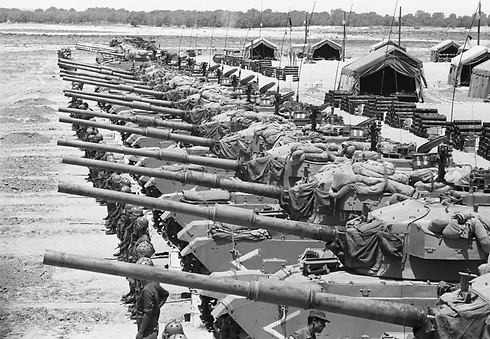
Sharon asserted that closing the straits was important, but not the most important issue at hand: "The loss of our deterrence - that is the most important thing. Since the War of Liberation (also known as 1948's War of Independence) we haven't faced such a grave situation. That is why this is an operation that will claim more casualties but we must go for it, because there is no escaping it."
Sharon stressed that the higher objective was to reach a situation in which the Egyptians "won't want to fight us."
He opined that Israel must act alone, and the fact it did not act alone in the 1956 Suez Crisis (Israel was aided by the United Kingdom and France) eroded Israel's deterrence and made it seem helpless.
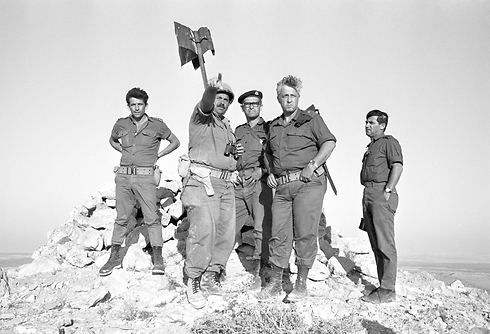
In what seemed like veiled criticism of Eshkol, Sharon implied that the then-prime minister was too busy "lobbying."
"There is a point, which will determine whether we can sustain our existence here for long or not, and it is our stance in the protection of our rights. All of this running around - and I won't use the word 'lobbying' - between the world powers … is not part of us standing for our rights," he said.
Maj.-Gen. Matti Peled was even more firm, and at a certain point he turned to the prime minister and his government and demanded: "The General Staff did not receive even one explanation as to why we are waiting. I can understand we are waiting for something. If we are, uncover the secret so we can know what we are waiting for!"
The only one to remain steadfast in the face of the generals' attacks was prime minister Eshkol, who chose at the end of the meeting to address Sharon's comments: "He spoke of lobbying and I wrinkled up my nose to hear that expression. I'm saying: All we have in our army's material strength - comes from this running around. We must not forget this and must not see ourselves as Goliath.
"Suppose we broke the enemy's strength today, indeed tomorrow we will have to start rebuilding our own strength... even if we start building planes ourselves - we won't be able to build engines that fast on our own. And so, if we have to fight every ten years, we must consider whether we have an ally to help us, or whether today we talk to an ally and tomorrow we tell it: 'We don't care about you.' That is why I asked the chief of staff if there is a difference between (a postponement of) two weeks or three-to-four weeks."
But Peled would not let go and said: "We've asked for an explanation - what are we waiting for?"
To which Eshkol responded: "If I haven't explained this until now - I will not explain further."
'10:08 am: The Temple Mount is ours'
The Six-Day War's operations log is the shortest of all Israeli war logs. The war, which expanded Israel's territory and was etched in the Israeli psyche as the most successful of its wars, only lasted six days.
This is how the war was documented in the IDF's Operations Room:
On the first day of the war, June 5 at 9:30 am, the decision was made to take over the Gaza Strip, and the log showed this decision was made following the bombardments in the Strip. Also on the Egyptian front - at 11:05 am, the Israel Air Force summed up its strikes against the Egyptian Air Force: So far, at least 180 planes were hit. It was this move that ensured Israel's aerial supremacy.
On the Syrian front, it appeared that the alliance between Damascus and Moscow has always concerned Israel.
"At 11:05, in a meeting with the defense minister, it was agreed we should not touch Syria because of the Soviet Union's position," it was written in the operations log. "It was agreed that as long as they (the Syrians) don't act, it would be better to come out 'without a scratch.'"
The most interesting front, however, was the Jordanian front - including Jerusalem. On June 6, a meeting took place in the morning hours in which then-defense minister Dayan determined that "during the takeover of the West Bank, we must open the Jaffa and Damascus gates and leave them open - but entering the Old City is prohibited."
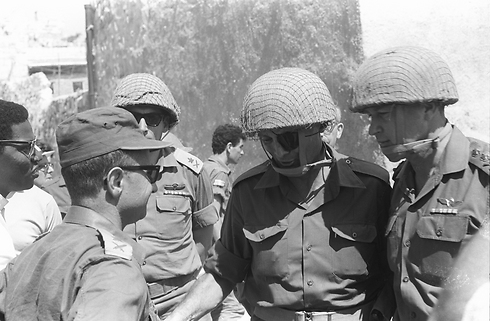
The next day, June 7 at 1 am, the defense minister stressed that the first priority on the Jordanian front was capturing Jerusalem. At 6 am, the order was given to the GOC Central Command to "first get Jerusalem, this is more important than anything else."
At 7:35 am, the defense minister reiterated: "Jerusalem - make every effort, go in at any cost. With the exception of the Holy Sepulchre and the (Al-Aqsa) Mosque, use air power as well." At 9:14 am, the Operations Directorate authorizes air assistance to the Old City.
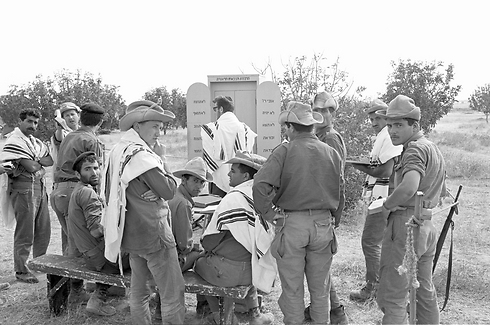
Then, shortly thereafter: "At 10:08, we received the news that the Temple Mount was in our hands and that our troops were next to the Western Wall. There and then the defense minister instructed not to go near the mosques."
At 10:30 am, the order was given to open the Old City's gates - the Damascus Gate, the Jaffa Gate and the Zion Gate.
The IAF commander also received orders not to bomb the Jordanian capital Amman without the authorization of the chief of staff, who, according to the operations log, arrived in Jerusalem at 1 pm with the defense minister. Among the pages of the log it is clear the issue of the Palestinians was already worrying the heads of state and military.
On June 9, the news of another front being taken arrived from the GOC Central Command: "I am happy to inform you that all of our troops are now at the banks of the Suez Canal and Yam Suph (the Red Sea), the Sinai Peninsula is in our hands. Congratulations to you and the entire Israel Defense Force."












